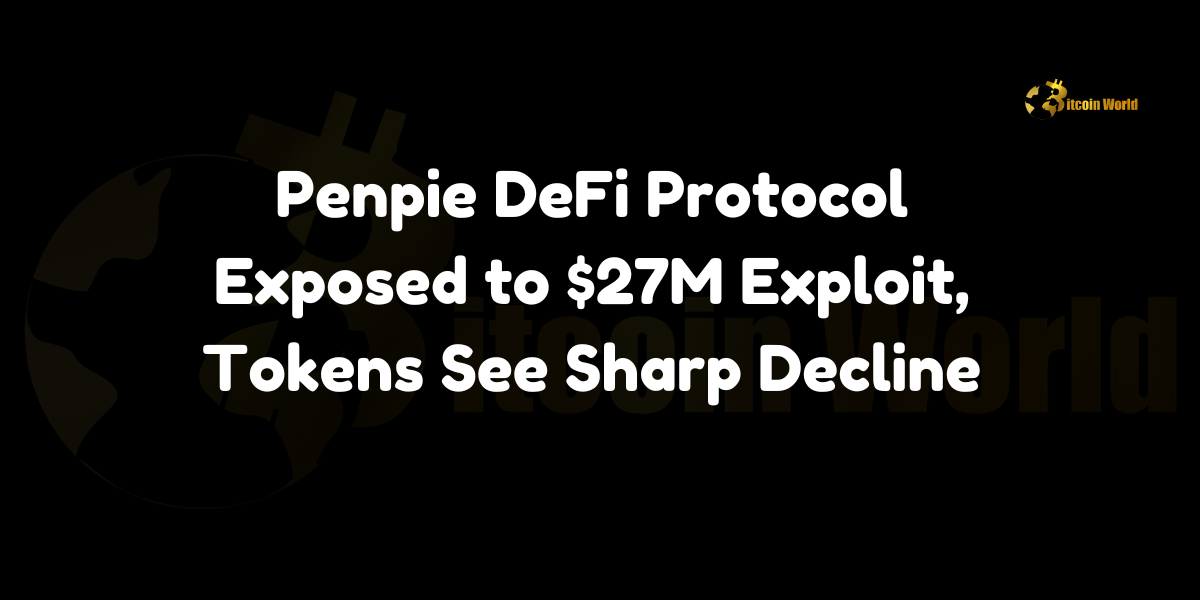Penpie DeFi exploit $27M has sent shockwaves through the decentralized finance (DeFi) space after an attacker successfully siphoned approximately $27 million worth of cryptocurrencies from the Pendle-based protocol. According to a report by CoinDesk, the stolen assets included wstETH, sUSDe, agETH, and rswETH. The hacker used the LI.FI protocol to convert the funds to ETH and transferred them to a new address. In response, Penpie has temporarily suspended all contracts as a precaution, while reassuring investors that their funds remain safe.
Details of the Exploit
The Penpie DeFi exploit $27M incident occurred when the attacker managed to exploit a vulnerability within the Penpie protocol, which is built on the Pendle DeFi platform. The attacker stole various digital assets, including:
- wstETH (Wrapped stETH)
- sUSDe
- agETH
- rswETH
Following the breach, the attacker used LI.FI to convert the stolen assets into Ethereum (ETH) and transferred the funds to a new address, making it difficult to trace or recover the assets.
Pendle Project’s Response
In a statement released shortly after the exploit, the Pendle project confirmed the hacking issue within the Penpie protocol. However, the team reassured investors that their funds are secure, suggesting that the breach primarily affected Penpie’s own funds rather than user deposits.
- Contract Suspension: As a precautionary measure, Pendle has temporarily suspended all contracts associated with Penpie to prevent further exploits while they investigate the vulnerability and work on a resolution.
- Investor Assurance: Pendle’s announcement emphasized that no investor funds were compromised during the exploit. This assurance has helped to mitigate concerns, although market reactions have shown a significant impact on token prices.
Market Impact
The Penpie DeFi exploit $27M has had an immediate impact on the market, with the price of Penpie’s native token, PNP, dropping by approximately 40% following the news of the breach. Meanwhile, Pendle’s token, PENDLE, also saw a decline of around 8%, according to CoinGecko data.
- PNP Token Drop: The sharp decline in PNP reflects investor concerns over the exploit and its potential long-term impact on the protocol’s security and reputation.
- PENDLE Token Reaction: While the PENDLE token experienced a less severe decline, its 8% drop suggests that investors are closely watching how the Pendle team handles the situation and whether any further vulnerabilities will be uncovered.
Security in DeFi
The Penpie DeFi exploit $27M incident highlights the ongoing challenges faced by DeFi protocols in maintaining robust security. As decentralized platforms continue to grow in complexity, they also become increasingly attractive targets for hackers. This event serves as a reminder of the importance of thorough security audits and constant vigilance within the DeFi ecosystem.
- Future Safeguards: In light of the exploit, Penpie and Pendle will likely implement additional security measures, including more rigorous smart contract audits and enhanced real-time monitoring of transactions to detect suspicious activity.
Conclusion
The Penpie DeFi exploit $27M has put Penpie in the spotlight for all the wrong reasons, with the attacker successfully stealing millions in crypto assets and triggering a sharp decline in the protocol’s token value. While the Pendle project has assured investors that their funds remain safe, the incident underscores the critical importance of security in the rapidly growing DeFi space. As investigations continue and Penpie works to restore confidence, the long-term impact of the breach on its ecosystem remains to be seen.
To learn more about the innovative startups shaping the future of the crypto industry, explore our article on latest news, where we delve into the most promising ventures and their potential to disrupt traditional industries.
Disclaimer: The information provided is not trading advice, Bitcoinworld.co.in holds no liability for any investments made based on the information provided on this page. We strongly recommend independent research and/or consultation with a qualified professional before making any investment decisions.




